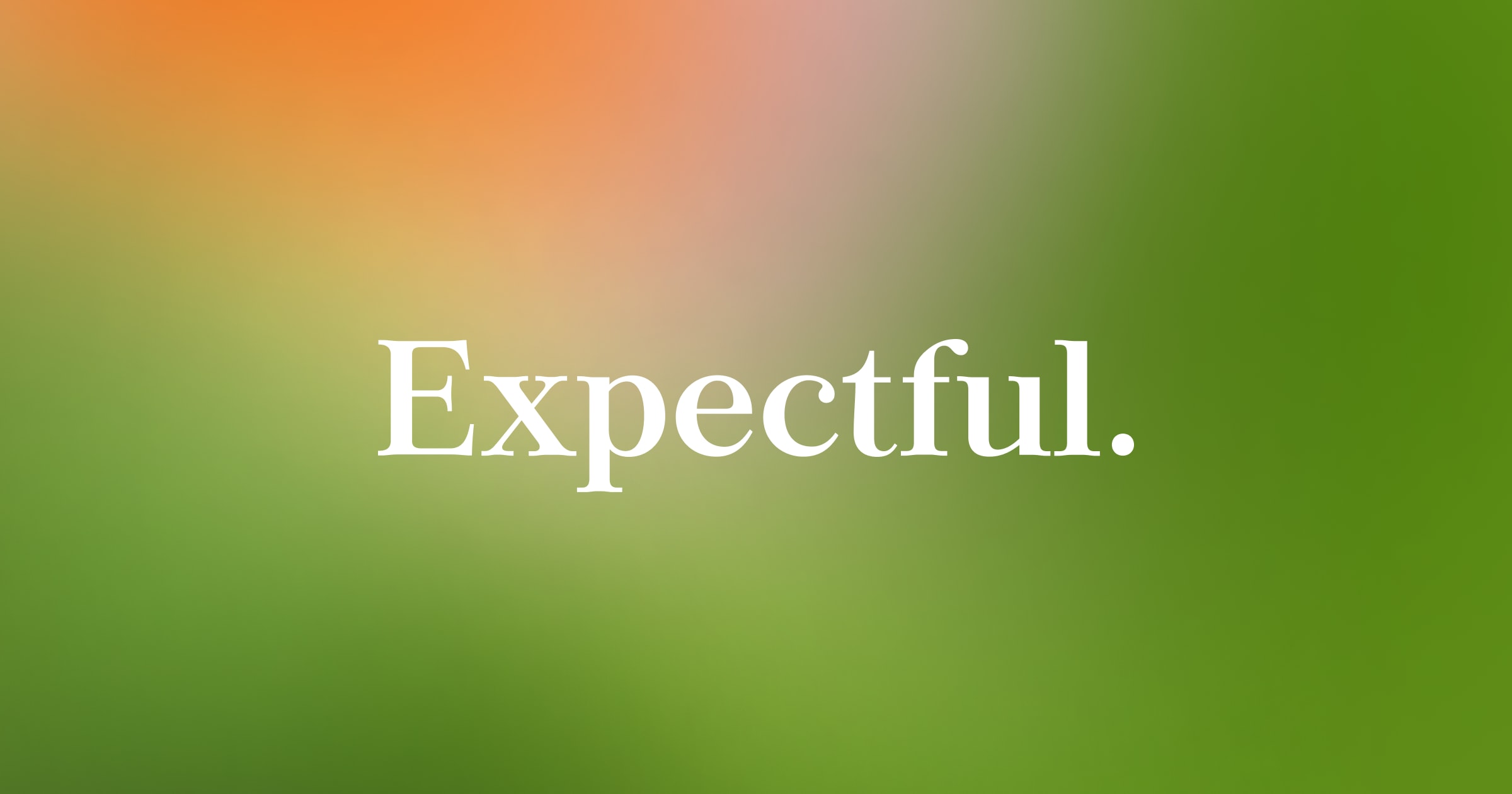

Nathalie Walton
At a Glance:
- Serving as another real-life experience behind Expectful’s mission to improve maternal mental health, our CEO used daily meditation to extend her high-risk pregnancy and lessen the effects of pre-term labor.
- Research is what backs Expectful’s mission:
- Women who used Expectful during pregnancy reported significantly lower Perceived Stress Scale (PSS) scores.
- Infants whose mothers participated in a mindfulness-based program during pregnancy had healthier stress responses at 6 months old.
- A study on preterm birth found that women in a mindfulness training program were 50% less likely to deliver early.
- Suggested Meditation: Trusting the Body
“25, 30, 35 visits?”
As I lay down for my ultrasound at 32 weeks, I tried to calculate how many more times I must visit the hospital before giving birth. At twenty weeks pregnant, I was diagnosed with a high-risk pregnancy with multiple complications that required consistent monitoring—as many as five doctor visits a week. I was told matter-of-factly: I would not make it to term.
I was blindly walking through a field of grenades every day I advanced into my pregnancy, carrying my most precious possession. Will we make it to tomorrow?
For weeks, I tried everything my team of doctors suggested in order to protect my unborn baby, but my physical and mental health continued to deteriorate. In my third trimester, I came across a pregnancy meditation app, and I started meditating daily. Within a week, my non-stress tests and doppler readings began to turn around, and I miraculously made it to term; a feat that no doctor thought possible.
Finally, in this bleak battlefield, I became a warrior.
We’re in the Midst of a Maternal Mental Health Crisis
I know that I’m not alone in the stress I experienced. Recent studies have found that “at the beginning of the COVID-19 pandemic, one in three new moms had postpartum depression, which was nearly three times higher than the rate before the pandemic.”
To understand my experience, I connected with Dr. Anne Porter, author of the study A Mindfulness Application for Reducing Prenatal Stress published earlier this year in the Journal of Midwifery and Women’s Health. According to her eye-opening findings, up to 40% of patients reported depression or anxiety symptoms during pregnancy.
More notably, the study discovered that feelings of increased stress are practically universal. “Antepartum stress is linked to negative outcomes, including preterm birth, low birth weight, postpartum depression, and maternal self-harm.”
As part of her study, Dr. Porter enrolled pregnant patients to examine the impact of meditation on Perceived Stress Scores (PSS) in Pregnancy. Patients that actively engaged in a meditation practice saw (PSS) drop by 25%. Their conclusion? Prenatal mindfulness apps represent an important low-intervention, low-cost, and highly accessible tool for managing perinatal mood and stress.
Dr. Porter said I personally saw improved outcomes in cultivating a mindfulness practice because“mindfulness decreases cortisol, the stress hormone. When you look at patients who use mindfulness, it’s about both the drop in cortisol that we see through mindfulness that the science supports, and it’s the ownership and sense of having something they can do,” she explained. “And being in control of that also helps decrease stress.”
Mindfulness Apps Are Low Cost, Low-Intervention, and Highly Accessible Tools for Improving Maternal Mental Health
My harrowing pregnancy ended in an emergency c-section and a two-week NICU stay for my son. I was not prepared for the mental anguish an unexpected NICU stay would cause. Recent studies note, “Parental experiences in the NICU are often characterized by psychological stress and anxiety following the birth of a critically ill or premature infant.” This intense distress doesn’t just have a negative impact on parents but also on their vulnerable infants once they’re discharged from the NICU.
At the time, I couldn’t be bothered with the thought of meditation. The only thing I wanted was to nurture my baby. Even feeding my son, the most innate of human actions, was inaccessible to me.
I wish I’d known then that mindfulness could also be a path toward improving my mental state and achieving my feeding goals under this extreme duress.
Dr. Katherine Massa and Dr. Shilpa Babbar examined the impact of meditation on NICU moms, in The American Journal of Perinatology. The study was a randomized control trial examining the effect of meditation on the breastmilk supply of women delivering preterm infants. The meditation group engaged in daily use of a mindfulness-focused meditation app in addition to routine lactation support. For women engaging in frequent meditation, the study found that mothers produced 7.5 oz more breastmilk per day, and had reduced symptoms of postpartum depression, as compared to those without a meditation practice.
Better Maternal Mental Health Has Positive Impacts on Babies, as Well
Not only can mindfulness support maternal mental health—UCSF recently conducted a study examining infants whose mothers participated in a mindfulness-based program during pregnancy. The study found that babies whose mothers participated in the study had healthier stress responses at 6 months old. Like most women, I never learned of the benefits meditating every day could have on my own child; I only found out after giving birth.
The researchers studied 135 mother-infant dyads from low-income, racially and ethnically diverse backgrounds who were experiencing high stress. After an eight-week mindfulness program, the babies who participated developed more self-soothing behavior compared to those who didn’t, and recovered faster from stressful interactions on a cardiovascular level
After living through a distressing pregnancy and depleting NICU stay, I can say without a doubt that my own postpartum experience in using mindfulness has helped me be a more patient parent. Taking those moments for myself was crucial in how I responded to my baby’s needs. As new moms, we don’t realize how important maintaining peace of mind is in surviving those initial newborn months—but it’s when we need it the most.
Mindfulness Doesn’t Need to Involve Meditating for 30 Minutes, Propped on a Cushion
Before I started using a meditation app, I thought mindfulness meant sitting on a mat trying not to think. Not necessarily an appealing activity.
But I’ve since learned it’s so much more than that.
Mindfulness can come in the form of walking meditations, sleep meditations, hypnobirthing meditations, or even mindful yoga. What it’s come to mean for me, however, is being more present in my mind and body—in feeling more empowered to advocate for myself.
Pregnancy, childbirth, and motherhood is all around us, and for many, it is us. How have we not properly cared for the immense mental weight that affects such a pivotal role in humanity’s structure? As I live and breathe this new reality, I can’t help but call on my entrepreneurial spirit.
A Possible Solution in the Palm of Your Hand
What if a low-risk, low-cost tool for combating the maternal mental health crisis was right at our fingertips, in a phone app? What if individuals, even from underserved communities, had the power to improve their maternal mental health? Or even see other benefits such as increased breast milk production and improved stress responses in their infants?
A solution might be more readily available than we’ve thought—in the power of mindfulness. As Dr. Porter says “Being able to do that with something that’s in your pocket at all times is a game-changer.”
Meditation apps give women the ability to take back ownership and know their needs, she adds. This gives communities “a way to take charge again and be in the driver’s seat of their body, their mind, their health, their pregnancy.”

The Meditation and Sleep App for Fertility, Pregnancy and Parenthood
We understand that growing your family while having a healthy and happy pregnancy and baby is probably a top priority for you right now.
We created Expectful to help you harness the power of your mind to have a healthy, happy pregnancy and baby.
All of our meditation content is based on interviews with many soon-to-be and new parents just like you, and is created with the help of licensed psychologists, hypnotherapists, and meditation experts. You can practice in just 5 minutes a day.












